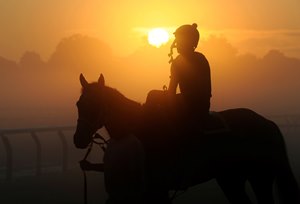Report: NY Equine Lab Trying to Keep Up With Doping


New York's Equine Drug Testing and Research Laboratory has found itself trying to keep up with the people who are doping racehorses, according to a Feb. 6 report by the Times Union, due to the difficulty of tracing adulterated and misbranded performance enhancing drugs.
The New York lab can identify only a portion of the substances found in samples taken from racehorses in New York, the Times Union's Emilie Munson reported.
"Here's the problem: The so-called performance-enhancing drugs, no one—nobody—knows what they are," The New York Equine lab's director Dr. George Maylin told the Times Union. "Nobody has a test for them."
The doping of racehorses came to the public spotlight in March 2020 when over two dozen people, including trainers and veterinarians, were arrested following an FBI investigation. Among those people were prominent Thoroughbred trainers Jason Servis and Jorge Navarro.
Maylin also told the Times Union that he is not familiar with some of the compounds of the drugs that were described in the federal indictments, and therefore is not able to test for them. He added he's requested samples of those drugs from the Justice Department.
For an example in trying to keep up with testing, the use of erythropoietin, or EPO, a hormone that stimulates red blood cell production, can improve a horse's endurance during a race. However, EPO can be hard to detect, especially when given by micro-dosing. The Times Union noted that the New York lab, and most other equine testing labs in the country, can only test for three types of EPO, but there are 82 kinds worldwide.
"…they've been synthesized; they're available," Maylin told the Times Union. "So if you're testing for EPOs and you're only doing three and there are another 70-plus out there, who are you kidding?"
The client list of Dr. Seth Fishman, who last week was found guilty of two counts of conspiring to violate adulteration and misbranding laws and the manufacture of PEDs to be administered to racehorses, contained over 2,000 businesses and people, including 265 of which were in New York, the Times Union wrote. Prosecutors said Fishman supplied illegal products to be administered to racehorses.
Prior to being arrested in 2020, Navarro, who purchased products from Fishman, went 13 years without a drug violation in New York or 14 other states, the Times Union found reviewing regulatory data. Thoroughbred trainer Michael Tannuzzo had no positives in New York prior to his arrest either, while Servis had one in the state in 2005.
Navarro has pled guilty in the federal doping case; Servis has pled not guilty and is awaiting trial.
Maylin also told the Times Union that the amount of samples collected from racehorses by the New York State Gaming Commission has decreased more than 20% since 2015 (before accounting for disruptions during the COVID-19 pandemic) due to a lack of resources.
The Times Union spent more than six months examining horse racing in New York and elsewhere for this story and more related ones to come, speaking with multiple key stakeholders during that time.
